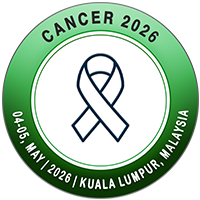
Raja Muhammad Umer
Jinnah Sindh Medical University, PakistanPresentation Title:
Two decades of burden: Mortality trends of renal failure among cancer patients in the United States (1999–2020).
Abstract
Background: Renal failure significantly worsens cancer outcomes through treatment limitations, heightened infection risk, and cardiovascular complications. The combined burden increases mortality risk, yet long-term national trends remain underexplored. Identifying demographic and geographic disparities is essential to guide integrated oncology–nephrology care.
Methods: We conducted a retrospective observational study using CDC WONDER multiple cause-of-death data (1999–2020). Adults aged ≥25 years with cancer as a contributing cause and renal failure (ICD-10 N17–N19) as the underlying cause were included. Age-adjusted mortality rates (AAMRs) per 100,000 population were standardized to the 2000 U.S. census. Joinpoint regression estimated annual percentage change (APC) with 95% confidence intervals, stratified by age, sex, race/ethnicity, census region, and urbanization.
Results: A total of 712,379 deaths were identified. Mortality peaked in 2011 (AAMR = 16.5; 95% CI 16.4–16.7) before declining to 12.7 in 2020. Males had higher mortality than females throughout (2020 AAMR: 17.7 vs. 9.2). Black/African Americans recorded the highest rates (peak 27.8 in 2011 vs. 18.8 in 2020), while Asian/Pacific Islanders had the lowest (peak 12.7 vs. 8.0). Older adults (65+) bore the greatest burden (peak 63.2 in 2006 vs. 51.7 in 2020). Large Central Metro areas showed significant declines post-2011 (APC = –6.94; p = 0.036), whereas micropolitan regions had a significant early rise (APC = 1.23; p = 0.011). The West region showed a significant increase until 2012 (APC = 1.01; p = 0.038) before declining.
Conclusion: Mortality from renal failure among U.S. adults with cancer declined after 2011, reflecting advances in nephroprotective care and CKD management. Persistent disparities by race, geography, and age demand targeted interventions and equitable access to integrated kidney–cancer management strategies.
Biography
Raja Muhammad Umer is a third-year medical student at Sindh Medical College, Jinnah Sindh Medical University, Karachi. Deeply committed to medicine, research, and community service, he aspires to become a physician who combines clinical excellence with public health impact. He has participated in several outreach activities, including volunteering with Special Olympics Pakistan, where he contributed to the health screening of athletes with disabilities. These hands-on experiences have reinforced his dedication to providing equitable healthcare, especially to underserved communities. He has also contributed to academic research with a strong interest in revolutionizing esophageal cancer care. He is passionate about integrating modern approaches, including early detection strategies, multidisciplinary treatment planning, and research in precision oncology, to improve outcomes for patients facing this aggressive disease. His goal is to be part of the global effort to transform how esophageal cancer is diagnosed and managed. He is especially interested in the intersection of medicine, research, and community development. Umer believes that physicians must not only treat disease but also address the broader social determinants of health. Through continued learning, service, and innovation, he hopes to contribute meaningfully to both clinical care and healthcare systems reform locally and globally.

